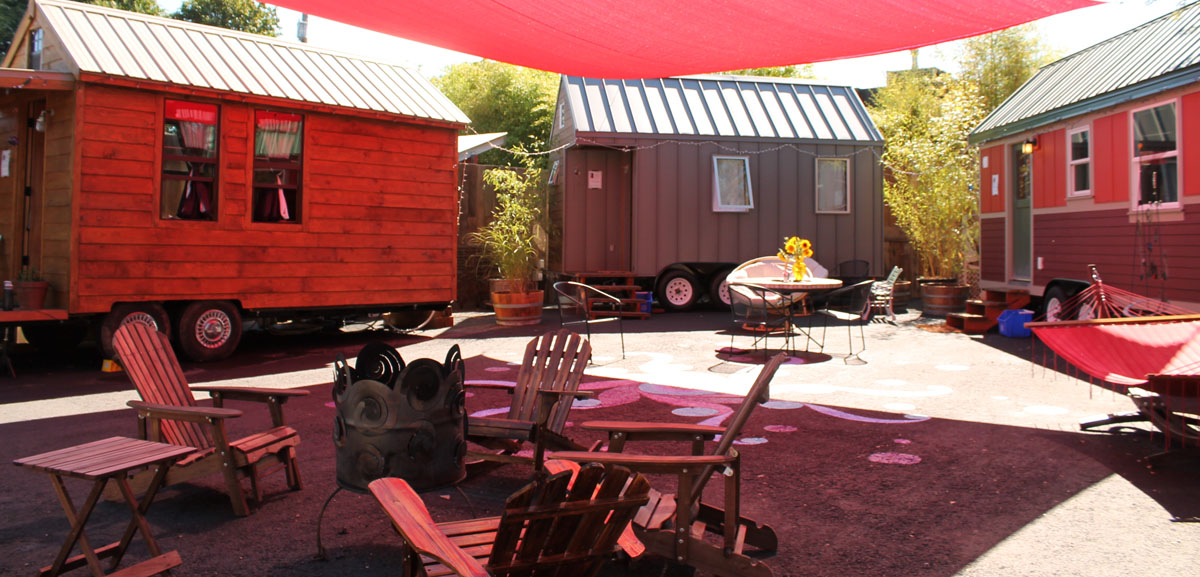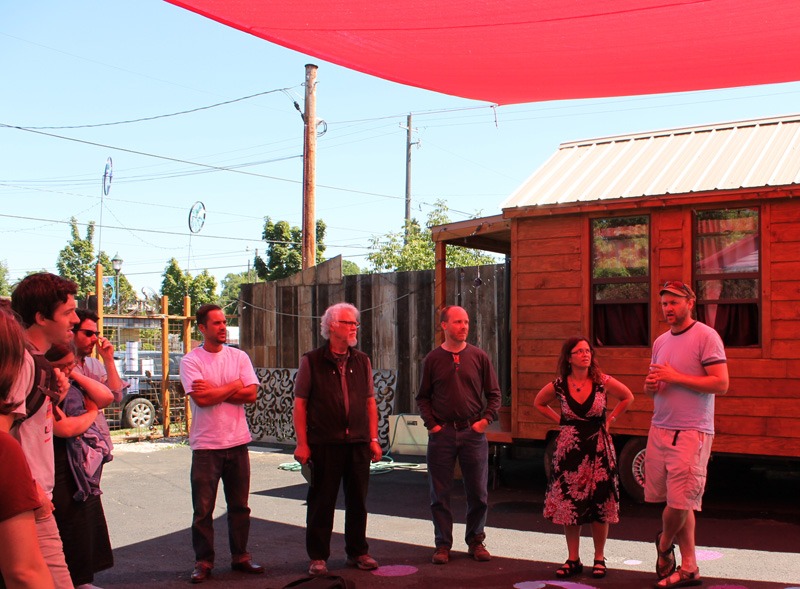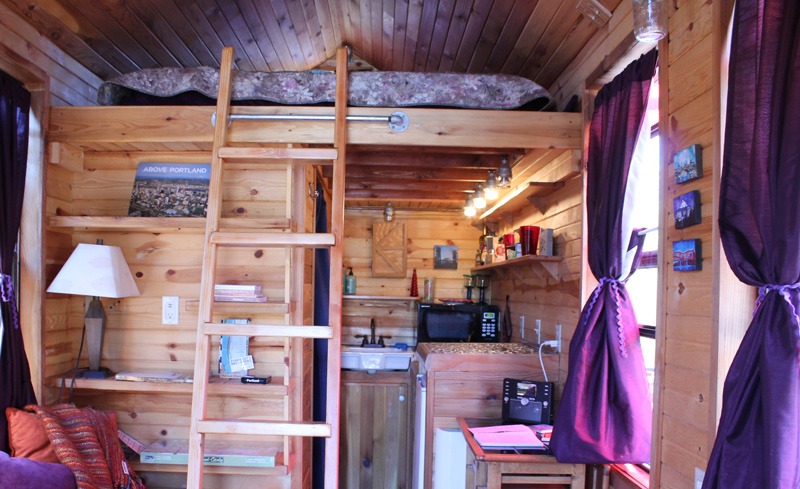
Last week we posted part one of our interview with the founders of Caravan, America’s first tiny house hotel. We knew we were excited about Caravan because they offer people the rare option to rent a tiny house by the night and see how it feels, and let people see different types of houses side by side. But what we discovered by talking with founders Kol Peterson and Deb Delman was that tiny houses have some of the same benefits in a commercial setting that they do in a residential setting: More flexibility through their mobility and lower up-front costs, and greater opportunity to meet, collaborate, and share with neighbors. Read on for part two of the interview, covering how the hotel came to be, advice for other tiny house hoteliers, and how tiny houses can support the sharing economy and flexible urban planning.
Billy: What was the approval process like with the city?
Deb: We met with the city probably over a year ago for the first time, and they were scratching their heads. They said, “So you want food carts?”, and we said no, and they said, “So you want to build a hotel?” And we said, no, and they said, “You want a hotel that’s tiny houses on wheels?” There’s nothing like it. Once we got so clear that it was the best idea ever, then we were ready to talk to the city, and it took us a solid year to get it worked out.
Kol: It took a lot of work just to find the right person at the city who was willing to entertain this notion, and have the level of commitment needed to have the series of conversations we needed to have. There are a number of different regulations that could apply to this situation, so it was a matter of working through all the different codes and deciding what could apply to a hotel made of tiny houses on wheels. We’ve had to proactively seek out conversations with all different city departments to make sure we’re crossing our Ts and dotting our I’s.

Billy: My understanding is that the zoning of this lot is rare. Do you think it’s even possible to do this in other cities? Do you know if there are any other tiny house hotels in the works?
Kol: A few people have contacted us because they’ve wanted to do something similar, but couldn’t get it worked out. I would be hesitant to pursue trying to do this in most cities. But now that there’s an example out there, maybe it’ll be more feasible. People can show pictures from our website and explain, “This is what we want to do, and this is how it will be used.” It’s not that we dealt with a bunch of super progressive people from the city. They just found codes that allowed us to use the site how we wanted to use it. I don’t know if other cities have those codes.
Billy: What advice would you have for someone trying to do this elsewhere?
Deb: My advice would be the same advice you have to give to someone doing any groundbreaking endeavor: don’t give up when you’re told no the first 20 times.
Kol: Find the right person at the city or county who knows the codes really well and is willing to entertain your questions. The nuts and bolts of it are that in most places in the country, every residential property doesn’t allow overnight accommodations. You have to stay for at least a month, generally. So you can’t put a hotel on a residential property; it has to be commercially zoned. But most commercial zones would have an issue with habitable trailers on a lot. So the zoning type has to allow for both the use type and the units themselves. We were really lucky that our lot is zoned the way it is.
From an urban planning perspective, this is a way to create infill that fills a market demand in a temporal way. We could have put up a permanent hotel, but that would have made it more difficult and more expensive to convert it to a different kind of use in the future. By putting in modular units like this, we can change out the building stock over time to meet market demand, and we can change the use over time pretty easily. A similar model that we’re all familiar with here in Portland is the food cart pod, which is an incredible way to take advantage of empty spaces that aren’t being used otherwise. We’re making this community space out of what is otherwise just a parking lot. This is pretty similar to that. If this business model doesn’t work out, this can be converted to other things pretty easily. It could become a food cart pod, or we could provide a space for massages and acupuncture. It could be like a modular health pod. To me that’s an interesting aspect of this that riffs off of the food cart model, but expands that concept to different services.

Billy: We’ve also seen food carts become an incubator for restaurants. Something will start as a food cart, get popular enough to become a restaurant, and then their cart will disappear and a new cart will go in. Right now, Caravan probably only serves that way for the builders. I think it’s likely that tiny house enthusiasts could stay here and decide, I want this design, or I want my house built by this builder. But that could expand over time to hospitality-supportive businesses, like the masseuse you spoke with. If you provide micro space with lower start up cost to services that pair well with what you’re offering, it could help them get off the ground. And then eventually when their business is strong enough, they might want to move into a more traditional space.
Kol: Cost is a big issue. Even though we spent a lot of money putting this together, it’s probably one tenth of the cost of building a commercial hotel of a comparable size. So the barrier to entry is a lot smaller.
Billy: I think it’s really exciting that you have the potential to collaborate on things like room service from the restaurant next door, and massages from the masseuse down the street. It’s a neighborhood collaboration that doesn’t happen unless you give up some things and say, “Here’s what I provide. What I don’t provide is this other stuff.” You don’t need to, because someone else already provides that. That’s what sharing is. Tiny house residents experience the same thing when they make choices about what they need all the time, like a bed, and what they only need occasionally, like laundry.
Everyone’s been talking about things like car sharing for a while now, and this is a new aspect of that idea. When you build a traditional hotel for ten times the money you spent on this, how do you recoup those costs? You upcharge a bunch of massages, and you upcharge a bunch of room service. Instead, you’re not taking on those costs in the first place, letting other people provide those services, and sharing the wealth.
Kol: Exactly. And that’s very tiny house-esque.

Comments are closed.